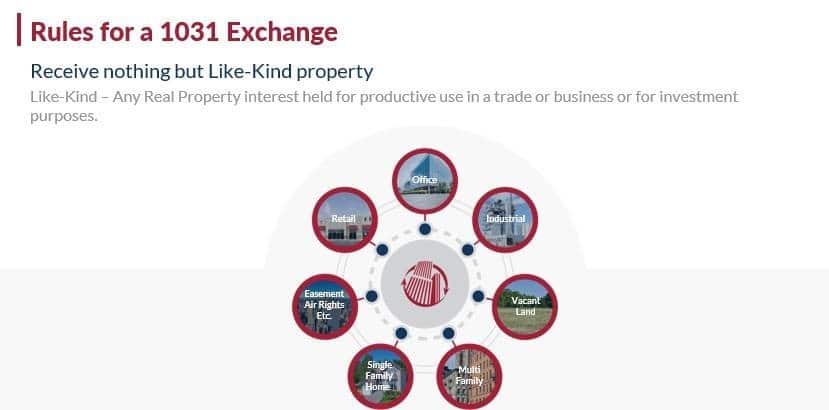What is 1031 Exchange?
An IRC §1031 tax deferred exchange allows owners of real estate to defer the recognition of a capital gains tax they would normally recognize when they sold their property. Exchanging allows investors to reinvest money into new business or investment real estate that would otherwise have been paid to the government as a capital gains tax. Tax deferred exchanges are not new – they have been available in one form or another since 1921, and in its current format since 1986.
Simply put, an exchange is structured as a sale, just like any other sale, and a purchase just like any other purchase, but with the inclusion of a Qualified Intermediary to structure the transaction as an exchange. Instead of paying a capital gains tax, an exchange enables an investor to use that money toward the purchase of a new property. In order to obtain this benefit, it is important to involve a Qualified Intermediary before you start your transaction, and to comply with the Tax Code’s requirements throughout the transaction.
It is never too early to contact us to discuss the benefits of a 1031 exchange and potential Exchangers are encouraged to call or email our office with any questions.
“Like-Kind” Property
One of the most misunderstood concepts of tax deferred exchanges is the requirement to exchange “like-kind” real estate. Many people mistakenly believe that “like-kind” means that you must acquire the same type of real estate that was sold in order to complete an exchange. Nothing could be further from the truth. Exchangers can sell one type of real estate and buy an entirely different type of real estate. In order to qualify as “like-kind,” the real estate must be held for productive use in a trade or business, or for investment purposes. Real estate held primarily for resale purposes (flips, held for a year or less, or as inventory) or for personal use is generally disallowed. Most real estate that produces rental income is generally eligible regardless of the type. Real estate that is part primary residence and part rental property can generally qualify in part.
What this means is that Exchangers have the opportunity to purchase replacement real estate of any type. For example, an Exchanger can sell vacant land and buy a strip mall or sell an apartment building and buy a triple-net lease property. 1031 Exchangers can look to a combination of federal and state law to help determine if an asset is real estate for purpose of the like-kind requirement. Based on this guidance, the definition of “real property” for 1031 purposes is very broad and generous to investors. Therefore, it may be possible to exchange real estate interests such as air rights, easements, tenant-in-common interests, options, leases, conservation easements, oil and mineral rights, and development rights for similar rights or even for more traditional rights like fee interests in real estate. The below graphic illustrates how all real estate held for business or investment purposes is “like-kind” to all other real estate held for business or investment purposes.
Who is Legal 1031?
Legal 1031 Exchange Services, LLC is a Qualified Intermediary for IRC §1031 tax deferred exchanges. A Qualified Intermediary is an independent third party to the transaction whose function is to structure the exchange, as well as to act as the independent escrow agent for the exchange funds. While a Qualified Intermediary may not provide tax or legal advice we can, however, provide information and assistance.
Legal 1031 Exchange Services, LLC prides itself on providing the support and information you need to complete your 1031 exchange transaction. Our experience enables us to handle many different types of exchanges. Legal 1031 is committed to giving personalized service to every client, but especially those who are new to 1031 exchanges.
Legal 1031 takes multiple steps to provide the utmost security for your exchange funds including the use of a fidelity bond and segregated dual signature escrow accounts. Exchange funds are never “invested” as with some other qualified intermediaries – Legal 1031 only deposits exchange funds in money market and savings accounts as principal retention is of the utmost importance.
- Delayed and Simultaneous Exchange Structures
- Reverse and Improvement Parking Exchanges
- Segregated Escrow Accounts for each Exchange
- Dual-signature Escrow Accounts
- Fidelity Bond for Unsurpassed Security of Exchange Funds
- Unparalleled Expertise and Customer Service
- Member of the Federation of Exchange Accommodators
- Accredited Continuing Education Courses for Attorneys, CPAs, Realtors, & other Professionals
- Attorneys and CPA on Staff
- Certified Exchange Specialists on Staff
Legal 1031 Exchange Services, LLC does not provide tax or legal advice, nor can we make any representations or warranties regarding the tax consequences of your exchange transaction. Property owners must consult their tax and/or legal advisors for this information. Our role is limited to serving as qualified intermediary to facilitate your exchange.
© 2021 Legal 1031 Exchange Services, LLC. All rights reserved.

